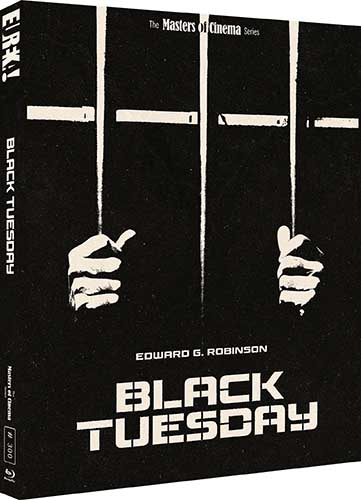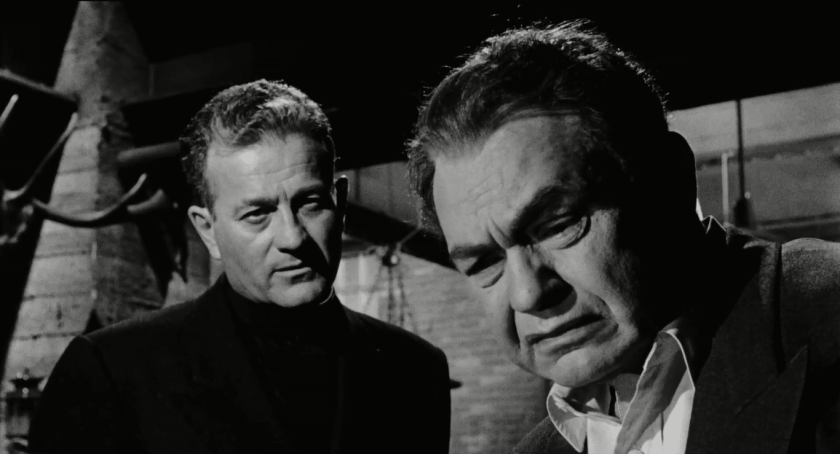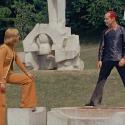The universal fear of dying is the theme of Black Tuesday, a terse, bleak 1954 thriller that is belatedly being recognized as a major film noir and has just been released on a Masters of Cinema Blu-ray.
Written by the former newspaperman Sydney Boehm (who also scripted The Big Heat), the movie was directed by Hugo Fregonese, the nomadic Argentine auteur whose films frequently explored entrapment. Stanley Cortez’s expressionistic black and white camerawork, notably his use of chiaroscuro and huge closeups of faces juxtaposed to faces in medium shot within the same frame, captures rapid shifts in power and nerve.
It’s night on Death Row. The psychopathic mob boss Vincent Canelli (Edward G. Robinson), responsible for 17 homicides, and Peter Manning (Peter Graves), who killed a man during a heist, are to be fried in the morning. Cortez’s camera lingers on “the chair” – a grisly throne brilliantlly backlit by stark white dressing room bulbs – as Boehm's narrative teases out the ritualised preparations for its use. Black Tuesday was initiated around the time the Cold War spies Julius and Ethel Rosenberg were executed, and it exposes the inhumanity of making criminals suffer the mercury-drip agony of waiting to die.
 Not that Canelli – a crazier version of Robinson’s Little Caesar mobster, who was based on Sam Cardinelli but resembles Al Capone – elicits sympathy. Nor does he have much fear because he knows his moll, Hatti (Jean Parker), has made a plan to free him. He wants his fingers in the $200,000 that Manning hid before he was arrested, so he’s intent on bringing the younger killer with him.
Not that Canelli – a crazier version of Robinson’s Little Caesar mobster, who was based on Sam Cardinelli but resembles Al Capone – elicits sympathy. Nor does he have much fear because he knows his moll, Hatti (Jean Parker), has made a plan to free him. He wants his fingers in the $200,000 that Manning hid before he was arrested, so he’s intent on bringing the younger killer with him.
Having kidnapped and replaced a reporter among the execution witnesses, Canelli's hitman (Jack Kelly) – jittery unless he's pulling a trigger – springs his boss and Manning. Several guards and others buy it during the mayhem.
Canelli releases but callously jettisons three other Death Row inmates. Hatti and the wounded Manning retrieve his loot. The gang holes up in a warehouse with hostages – the prison chaplain (Milburn Stone) and doctor (Vic Perrin), the reporter, the grieving daughter of a kindly guard, and a spiteful younger guard.
Everybody yaps about death and survival. Cops surround the building. Canelli’s malignity overcomes his reason. One bad guy has a change of heart; the climax and its aftermath involve moral decisions.
Fregonese demonstrates his mastery of lean, unsentimental storytelling by immediately whipping up tension and preserving it to the last shot. Black Tuesday is a noir as sidewalk-hard as any directed by Anthony Mann or Samuel Fuller and one that recognizes the centrality of violence in American life. It’s there in every crease of Robinson’s rubber face, his Canelli the obverse of his gentle, susceptible noir characters in Double Indemnity, The Woman in the Window, and Scarlet Street.
The disc’s extras include a video essay by Imogen Sara Smith, an interview with the film historian Sheldon Hall on Fregonese, and an audio commentary by the noir podcaster Sergio Angelini.
- More film reviews on theartsdesk














Comments
Add comment